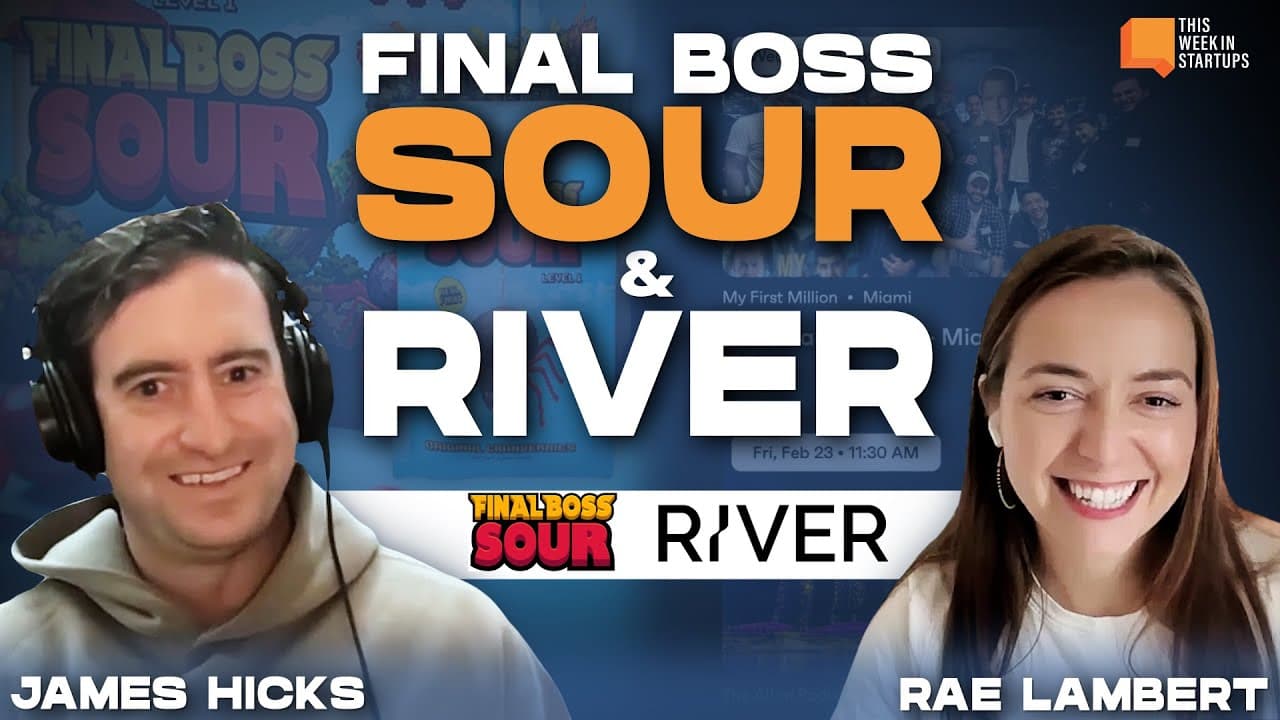Final Boss Sour’s James Hicks + River’s Rae Lambert | E1993
20 Aug 2024 (over 1 year ago)

Final Boss Sour: Brand and Product
- Final Boss Sour is a company that produces sour candies with a video game theme, targeting younger generations who distrust legacy brands and are open to new, authentic brands. (4m1s)
- The brand features a tiered system of flavors, labeled as levels, similar to a video game's progression. (5m38s)
- Final Boss Sour candies are described as a product that appeals to a niche market, similar to dark chocolate, where those who enjoy it tend to have a strong preference for it. (4m59s)
- Final Boss sour candy is inspired by the popularity of spicy food challenges and aims to create a similar experience with sourness. (8m1s)
- Final Boss candy uses real fruit, such as dried cranberries and blueberries, to achieve a more intense and natural sour flavor. (8m23s)
- Final Boss Sour has a sampler box designed like a board game where each level of sour fruit candy is in its own compartment. (14m22s)
- The company recently launched a 3.5-ounce bag of dried mangoes called Mango Dippers, which are sold with a sour blue raspberry dust for dipping. (14m41s)
Final Boss Sour: Marketing and Growth Strategy
- Final Boss Sour's social media strategy is twofold: creating engaging content on their own channels and leveraging user-generated content, such as the "one chip challenge" on TikTok. (17m49s)
- Final Boss Sour utilizes TikTok Shop by partnering with affiliates who create videos featuring their product, driving sales through a buy button linked in the video. (19m24s)
- Final Boss Sour is a direct-to-consumer brand that is exclusively available online. (24m56s)
- The brand's strategy involves building a loyal customer base and generating significant awareness before partnering with retailers like Walmart or Target. (25m51s)
- Mike Jones believes retailers are seeking exciting products and that innovation in some categories has become stagnant. (27m5s)
- Rae Lambert believes Final Boss Sour is ahead of the curve in terms of innovation and utilizes online storytelling to build brand awareness, viewing retail as the final stage of the customer journey. (27m58s)
- Final Boss Sour's branding, including its IP, was developed with a video game design company, and there are plans to launch casual games involving QR codes and potentially a more complex game like Super Mario Brothers. (30m19s)
- There is interest in incorporating influencers into the brand, potentially through limited-edition products or collaborations. (35m28s)
- Experiential retail, such as pop-up shops or interactive experiences, can foster brand loyalty. (37m4s)
- Final Boss Sour has utilized experiential elements at trade shows and events, incorporating game show-like aspects. (37m22s)
River: Platform Features and Benefits
- River is a platform designed to facilitate in-person meetups for online communities. (41m13s)
- Lambert's experience with existing event platforms while expanding All In meetups to 50 cities revealed their shortcomings. The River platform addresses these issues by enabling the creation of event templates for easy duplication. (46m39s)
- River's platform automatically adjusts event details, such as time zone and city image, based on the location selected by the user. (46m58s)
- River's platform offers batch editing, allowing users to update multiple events simultaneously by specifying criteria such as date range, title keywords, or tags. (47m23s)
- When a user applies to host an event on River, their application goes through a system similar to a lightweight applicant tracking system, where the community manager can review their profile, social media presence, and hosting history before approving or rejecting their application. (48m8s)
River: Business Model and Future Plans
- River is a platform that costs $500 per month to use. (53m6s)
- River has a developing sponsorship marketplace where brands can sponsor events. (53m31s)
- River is developing an ad network feature, similar to Google Ads, where users can pay to have their ads displayed to specific communities on the platform. (54m47s)
- There is a potential business model where event organizers could pay for a bundle of advertising to attendees of events like Tim Ferriss, My First Million, and This Week In Startups. (57m35s)
- River is partnering with a company that is organizing paid events in New York City and plans to expand to other cities. The events will use River's platform and revenue sharing model. (58m2s)
- River's platform will expand to include a marketplace for event-related roles like speakers, photographers, and check-in staff. (59m42s)